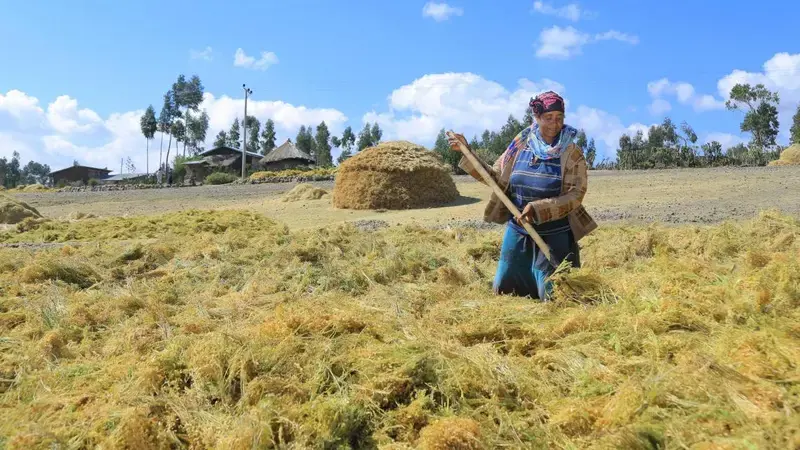Lentil farming and gender norms in Ethiopia

Although lentils are a critical source of income in parts of Ethiopia, not enough attention has been paid to farmers’ limited access to reliable information and improved seed varieties. Furthermore, the gender aspects of lentil production are rarely studied; gender and agricultural studies on legumes in Ethiopia have more often focused on chickpea, bean, and groundnut. Understanding gender norms related to lentil farming is important – and will help address constraints that affect the resilience of both women’s and men’s livelihoods.
New ICARDA research shows that the sale of lentils constitutes 50 to 100 percent of smallholders’ income in the Oromiya and Amhara regions, two of Ethiopia’s largest lentil-producing areas. The study explored norms surrounding the division of roles, farm-related decisions, access to lentil-based extension services, and innovations, particularly new seed varieties.
The research employed quantitative and qualitative interviews and focus group discussions with 554 male and female lentil farmers (288 men and 266 women). Special focus was given to female heads of households, as they are the most disadvantaged and often lack family and government support.
ICARDA researchers also worked with married female farmers who have limited access to extension and rarely participate in cooperatives, where their husbands play a lead role - resulting in the benefits of cooperatives (such as dividends, inputs, and trainings) being directed towards men.
Awareness, bias and extension services
To raise awareness about the harmful impacts of gender norms, farmers were invited to discuss key gender issues, including women’s limited participation in agricultural extension, the perception among men that women were not interested in farming and therefore did not need extension services, and prevailing norms that limited women’s mobility and participation in meetings. Both male and female farmers also noted that women’s multiple roles as both producers and caregivers limited their involvement in agricultural extension services.
In addition, women raised a number of explanations for their lack of participation. For example, they suggested that if their spouses attended meetings they did not have to attend, and complained that the timings of trainings often coincided with house chores. Female farmers from both regions agreed that female heads of households in general were better targeted by extension services than married women.
Challenges to lentil farming
Challenges were faced by both male and female farmers, including the increased variability of rainfall, the lack of attention to agronomic practices, and problems accessing new rust-resistant lentil varieties. The improved varieties that are available – Alemaya, Derash, and Teshale – were introduced several years ago, and are no longer rust-resistant and increasingly susceptible to wilt and pests such as aphids. They are also unpopular. In Oromiya, for instance, Derash is only cultivated by some 6.5 percent of female farmers and 10.4 percent of male farmers, attributed to the fact that it is hard to split, less productive than local varieties, and attracts less demand in local markets.
While lentil losses affect both male and female farmers, however, they tend to be greater for women. For example, in Oromiya, among survey participants, some 50 percent of female-headed households and 28.6 percent of male-headed households experienced losses. When interviewed, female farmers and traders also explained that the traditional way of threshing increased losses and reduced the cleanliness of the crop, which negatively affected market value.
When growing lentils, women were more affected by labor shortages (64.1 percent of women versus 26.1 percent of men), and also more likely to lack access to plow animals (10 percent of women vs. 4.5 percent of men). Women also explained how the norms surrounding farm-related divisions of labor did not allow them to plow, since plowing is mainly perceived as a “male only role.” This forced women to work as sharecroppers or to enter into a labor exchange arrangement to continue farming. This, and other challenges such as crop losses, are compelling female household heads without access to male labor to abandon farming all together.
Charting a way forward
Awareness and advocacy are crucial first steps towards changing this situation. Follow up focus groups and interviews with an additional 201 male and female respondents helped raise awareness about the harmful impacts of gender inequality.
Female participants from both regions also recommended that women be consulted on the timing and location of extension services so they could participate. Male participants noted that the lack of research and agricultural training support on lentil affects both men and women negatively, and as such should be improved so that both can benefit. Finally, female and male focus group participants recommended enhanced access to affordable farm inputs, such as effective chemicals and good quality seeds. According to participants, immediate actions were required to sustain already-established lentil markets and growing demand in both areas.
This study was carried out in Ethiopia from 2018-2019 and is funded by the CGIAR Research Program on Grain Legumes and Dryland Cereals.
For more information about the gender and lentil research project in Ethiopia, please contact Dina Najjar at [email protected]
